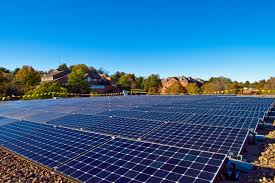
Since February, the European Commission has initiated three in-depth investigations of Chinese-owned companies to determine whether they have received foreign subsidies that give them an unfair advantage in an EU public procurement. In March, it terminated its first investigation when the targeted firm withdrew from a Bulgarian procurement. Then, on April 3, it initiated two new in-depth investigations of firms participating in a Romanian solar panel procurement. The Commission is conducting these investigations under a Foreign Subsidies Regulation (FSR) that was implemented in July of last year. This post looks at the three investigations, particularly, the issues underlying the first investigation, which provide an indication of how the EU is approaching application of this new trade defense tool.
The FSR requires firms wanting to participate in large EU public tenders (estimated value exceeds €250 million) to submit notifications of all financial contributions of at least €4 million received from foreign governments in the prior three years. After a preliminary review of the notifications, the Commission initiates an in-depth investigation where it has reason to believe the firm has received foreign subsidies that give it an unfair advantage in the procurement.
First Investigation Terminated
On February 16, the European Commission opened its first in-depth investigation to determine whether CRRC Qingdao Sifang Locomotive Co., Ltd. (CRCC), a Chinese state-owned firm, had submitted an unduly advantageous offer in a Bulgarian train procurement as the result of foreign subsidies. However, before it completed its investigation, the firm withdrew from the procurement. That procurement by the Bulgarian Ministry of Transport and Communications had an estimated value of around BGN 1.2 billion (€610 million).
The Commission initiated its in-depth investigation of CCRC when it concluded it had “sufficient indications” the Chinese firm had received foreign subsides that were “liable to improve [its] competitive position” and “potentially negatively affect competition within the internal market.” It based its conclusion on CCRC’s receipt of approximately €1.745 billion in foreign financial contributions (five times larger than its bid) and its submission of an offer substantially lower than the estimated costs of the contracting authority and the offer of its only competitor [Talgo, a privately owned Spanish rail company]. CCRC had not declared these subsidies in its FSR notification.
The Commission cited three sources of CCRC’s foreign subsides: (i) public procurement contracts awarded to it and to entities of its parent, CRRC Corporation Limited, of more than €7,5 billion; (ii) government grants of €804 million (as of 30 June 2023), accounted for as deferred income; and (iii) government grants (other than grants closely related to CCRC’s business) made available to CRRC Corporation Limited in amounts of €355 million for 2020, €301 million for 2021, €234 million for 2022, and €51 million for the first half of 2023. On March 26, the Commission announced it was closing its investigation of CCRC as the firm had withdrawn its bid in the procurement.
The China Chamber of Commerce to the EU accused the EU of using the FSR to coerce foreign firms to withdraw from public procurements and face non-market based business exclusion.
Two Investigations Opened
On April 3, the European Commission launched two new in-depth FSR investigations of Chinese-owned solar panel manufacturers suspected of receiving subsidies. The investigations relate to the potentially market distortive role of foreign subsidies given to two Chinese consortiums in a public procedure launched by a Romanian contracting authority (Societatea PARC FOTOVOLTAIC ROVINARI EST S.A.) for the design, construction and operation of a photovoltaic park in Romania, with an installed power of 110 MW. The total contract is reportedly worth about €375 million ($404 million).
The first investigated consortium is composed of the ENEVO Group (the consortium leader and a Romanian-based provider of engineering and consulting services) and LONGi Solar Technologie GmbH (a newly established and fully owned German subsidiary of a Chinese parent company, LONGi Green Energy Technology Co., Ltd, listed on the Hong Kong Stock Exchange). Both LONGi firms are active in the development, manufacturing and servicing of solar wafers, cells, and modules. Longi is the world's biggest solar panel manufacturer.
The second investigated consortium is comprised of two subsidiaries of Shanghai Electric Group Co. Ltd, a Chinese state-owned enterprise. The subsidiaries are the Shanghai Electric UK Co. Ltd. and Shanghai Electric Hong Kong International Engineering Co. Ltd.
The Commission initiated the investigations following its preliminary review that found sufficient indications that members in both consortiums have been granted foreign subsidies that distort the internal market. It must make final decisions in both investigations within 110 days of initiation (by mid-August).
When the Commission publishes notices of its initiation of the investigations in the Official Journal of the European Union, it is expected, as in the CCRC case, to outline the subsidies that it believes the consortium members received and how they may give the consortiums an advantage in the procurement.
Jean Heilman Grier
April 4, 2024
Related Posts
EU Targets Chinese Firm in First Foreign Subsidies Investigation
EU Foreign Subsidies Regulation & Procurement Obligations
2023 Developments in International Procurement

